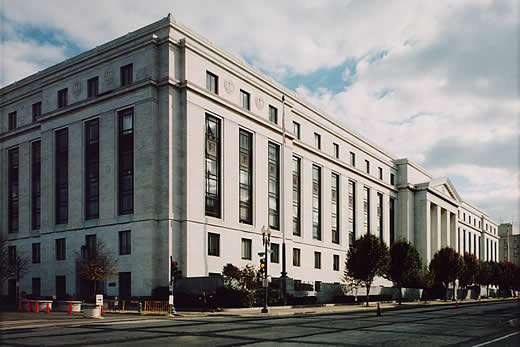The Senate Urges a More Assertive Approach Toward Libya Policy
At a hearing on Feb. 12, lawmakers on the Senate Foreign Relations Committee and senior American diplomats offered competing visions for the future of U.S. efforts to secure a negotiated solution to the Libyan civil war.

Published by The Lawfare Institute
in Cooperation With

At a hearing on Feb. 12, lawmakers on the Senate Foreign Relations Committee and senior American diplomats offered competing visions for the future of U.S. policy toward Libya. Where administration officials advocated for gradual, behind-the-scenes diplomacy to reinvigorate a stalled U.N.-led peace process, senators advocated for a more aggressive American effort to secure a peaceful resolution to the Libyan civil war.
Although violence has plagued Libya since a popular uprising ousted the country’s longtime dictator in 2011, fighting escalated sharply in April 2019 when Gen. Khalifa Haftar’s Libyan National Army (LNA) launched an offensive aimed at overthrowing the U.N.-backed Government of National Accord (GNA) in Tripoli.
The uptick in violence has drawn a number of foreign powers into the fray. Russia, the United Arab Emirates and Egypt have thrown their weight behind Haftar, providing him and the LNA funding, arms and more advanced military systems such as drones. Russia has also given Haftar support in the form of hundreds of mercenaries from the Kremlin-backed Wagner Group, which now fights alongside LNA militias. The GNA, in turn, enjoys support from Italy, Qatar and Turkey, and it recently received a flood of reinforcements when Turkish President Recep Tayyip Erdogan deployed a number of his own soldiers and thousands of Syrian militants to defend the besieged government.
In testimony before the committee, David Schenker, the assistant secretary of state for near eastern affairs, and Christopher Robinson, a deputy assistant secretary of state for European and Eurasian affairs, emphasized that the administration’s principal aim in Libya remains securing a negotiated end to the civil war and the withdrawal of the foreign actors fueling it. This outcome, Schenker remarked, would advance several key U.S. interests. It would allow the U.S. to consolidate its counterterrorism gains against the Islamic State in Libya, both by promoting stability and by making it easier for U.S. forces to target the Islamic State’s remnants in the country. And the expulsion of foreign actors from Libya would prevent Russia from gaining a strategic foothold on NATO’s southern flank.
Schenker added that to achieve these aims, the administration remains committed to the U.N. peace process. And Robinson, whose testimony focused on the State Department’s efforts to contain Russian influence in Libya, highlighted the administration’s naming and shaming of Moscow’s interference and its sanctioning of both the Wagner Group and Yevgeniy Prigozhin, the group’s owner.
The witnesses acknowledged several obstacles confronting U.S. efforts to advance Libyan peace talks and to secure the withdrawal of foreign actors from the country. First, the security situation in the country has severely restricted American diplomats’ operations there. While the U.S. has established a “Libya External Office” in neighboring Tunisia, Schenker noted that outreach on Libyan soil would “have the most impact.”
Meanwhile, Russia has worked to undermine the U.N.-led negotiations by creating a parallel diplomatic process. Last month, Russian President Vladimir Putin convened the GNA and the LNA in Moscow to discuss Libya’s future. The move replicates a tactic Putin has used in Syria, where he sidelined the U.N.-led peace process by establishing the Astana talks, which have involved only Russia, Iran and Turkey. Finally, Robinson conceded that while the administration has tried to ratchet up pressure on Moscow by pushing European countries to sanction Wagner and Prigozhin, it has yet to succeed.
Lawmakers saw larger flaws in the administration’s approach to Libya policy, however. Sens. Mitt Romney, Bob Menendez and Tim Kaine pointed to the administration’s failure to signal consistent support for one side in the civil war. Romney stated that while the State Department seems to support the GNA, President Trump has expressed support for Haftar and the LNA. Indeed, the president called Haftar last April to discuss their “shared vision” for a stable Libya. Menendez added that representatives of foreign governments seem unsure which side America supports.
Kaine decried that the administration’s seeming failure to choose a side in the war led it to block a U.N. Security Council resolution that the U.K. introduced last spring calling for an immediate cease-fire and an end to the LNA’s challenge to the U.N.-backed government. Schenker initially conceded that he did not know why the U.S. had opposed the British resolution. But in an exchange with Menendez later in the hearing, the assistant secretary offered instead that the U.S. opposed Britain’s resolution because it “lacked teeth” and would not have accomplished anything.
Schenker also largely dismissed senators’ concerns that the U.S. has failed to consistently support one side in the war. He stressed that the entire U.S. government supports the GNA but qualified that the administration will continue to engage with Haftar both because of the general’s prominence and because he has supported U.S. counterterrorism operations in Libya. Schenker declined to comment further in the hearing’s open setting on Haftar’s role in American counterterrorism efforts. But the assistant secretary’s prepared testimony made no mention of LNA support in the fight against the Islamic State. Indeed, it credits only GNA forces, with which the U.S. coordinated in 2016 to “oust [the Islamic State] from the coastal city of Sirte.”
Menendez, the ranking member on the committee, offered a still broader indictment of the administration’s Libya policy. He asserted that America’s opposition to the U.K. resolution at the U.N. Security Council reflected a stunning failure to coordinate with U.S. allies in advancing peace in Libya. And he added that the very fact of Russia’s and Turkey’s deep involvement in the Libyan war reflects an absence of U.S. leadership in resolving the crisis facing the strategically important country.
Sen. Chris Murphy agreed, adding that the administration has neglected to use the most powerful tools at its disposal to advance its aims in Libya. The Connecticut senator turned first to the president’s failure to sanction Haftar under the Countering America’s Adversaries Through Sanctions Act (CAATSA). Haftar, Murphy observed, works directly with the Wagner Group—which the State Department designated under CAATSA as part of “the defense sector of the Government of the Russian Federation.”
Murphy read directly from the relevant section of CAATSA, Section 231, to highlight that the act requires the sanctioning of the Libyan general. That section establishes that “the President shall impose … sanctions … with respect to a person the President determines knowingly … engages in a significant transaction with a person that is part of, or operates for or on behalf of, the defense or intelligence sectors of the Government of the Russian Federation” (emphasis added).
Murphy thus asked the State Department witnesses to clarify whether the administration plans to sanction Haftar under Section 231. Robinson stated that the administration is committed to implementing CAATSA but views sanctions as a tool that should be used to change behavior at a particular moment to achieve a specific outcome. The deputy assistant secretary said that Haftar is cooperating with the U.N.’s nascent 5+5 Libyan Joint Military Commission. Although the commission is not yet discussing a political resolution to the war, the administration hopes to encourage Haftar’s continued participation. Sanctioning the general under CAATSA, Robinson suggested, would not advance that aim.
But Murphy continued to press the senior diplomats. Referring back to the statute’s use of the word “shall,” Murphy stressed that CAATSA is not “permissive[.]” If Haftar is “operating in coordination” with an entity the State Department has designated under CAATSA, Murphy stated, “I don’t know that there’s a lot of discretion involved” in determining whether to sanction the general. In a later exchange, Menendez offered his full-throated support for Murphy’s assessment. As an author of CAATSA, the senior senator from New Jersey said, he could confirm that CAATSA is mandatory, not voluntary.
After the hearing, Murphy followed up directly with Secretary of State Mike Pompeo about the sanctions issue. In a letter to the chief diplomat, Murphy requested further information concerning whether Haftar’s ties to Wagner “trigger mandatory CAATSA sanctions pursuant to Section 231.”
The senator from Connecticut also rebuked the administration for failing to pressure U.S. partners meddling in Libya, such as the U.A.E., to withdraw from the country and to support a peaceful end to the war there. Murphy stated that in 2019 the president used emergency powers to sell the Emiratis $8 billion worth of arms. These arms sales specifically, and America’s robust business with the U.A.E. generally, offer the U.S. “levers” to pressure the Emiratis. But Murphy decried the administration’s unwillingness to use these levers. “We have this rhetoric about trying to put pressure on outside actors who are supporting destabilization inside Libya, and yet with the Emiratis it doesn’t seem like we’re willing to go to the mat.”
Menendez similarly criticized the gap between American rhetoric and action. In a tense exchange with Robinson, the senator scoffed at the notion that calling out Russian interference in Libya or naming and shaming other malign actors would at all influence their behavior. “I can’t wait to see us naming the names,” he said dryly.
This seemed to be the crux of the dispute between committee members and the administration. Murphy, Menendez and other senators want the U.S. to take a more aggressive approach to securing an end to the Libyan war and pushing for the withdrawal of the foreign powers fueling it. They want the administration to use the many levers it has, including the significant pressure it can place on its partners interfering in the conflict, to attempt forcefully to change the behavior of the external actors driving Libya’s continued violence. But the administration remains unwilling to take this forceful approach or to assume a more central role in the peace process aimed at bringing the nine-year Libyan conflict to a close.





